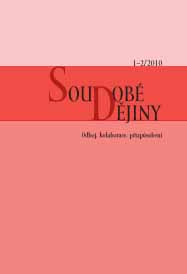Výchova k vlastenectví, nebo nacistická indoktrinace? Výuka českého jazyka na středních školách Protektorátu Čechy a Morava
Patriotic Education or Nazi Indoctrination? Teaching Czech at Secondary Schools in the Protectorate
Author(s): Martina ŠmejkalováSubject(s): History
Published by: AV ČR - Akademie věd České republiky - Ústav pro soudobé dějiny
Summary/Abstract: The article is concerned with the Czech language and its instruction in the Protectorate of Bohemia and Moravia, especially at secondary schools. Using primary sources, in particular curriculum materials related to the teaching of Czech, regulations issued by the Ministry of Education, period textbooks, and also correspondence, the author seeks to explain how official education policy was projected into actual teaching practice. She examines two main currents of instruction – the official, as refl ected in published materials, and the nonconformist, which even made its way into some passages of the textbooks used at the time. It is generally true, however, that textbooks and teaching practice were permeated with expressions of linguistic patriotism, which the supervisory bodies of the Protectorate or Reich tolerated. The main interference in the structural organization of teaching the subject was the dissolution of its previous unity: the bureaucrats in charge of education approached the basic constitutive components – the Czech language and Czech literature – separately and it is therefore now necessary to distinguish between them. While the content of the teaching of literature was suppressed and the existing textbooks were substituted for by individual volumes of the ideologically fraught Nová čítanka, Czech language instruction in this period drew mainly from the earlier traditions and suffered less. That was also because Czech language instruction and textbooks were not primarily meant for the task of reeducating, unlike the tasks of Czech literature, which was considered an ‘opinion-forming subject’. The exclusion of the history of literature from school instruction was in practice often circumvented by transferring its material, under the pretext of providing examples of the historical development of the language, to Czech lessons. The author pays considerable attention to the conception, content, cultural stereotypes, and values refl ect in the Nová čítanka. She sums up by saying that it provided a picture of the Czechs as a nation with a splendid folk traditional and a rather rich culture, which, however, could develop thanks only to the favourable infl uence of the German cultural genius, and also a picture of the Czechs as a nation that was once mostly agricultural, for whom manual work is by and large the most suitable form of labour. The ideological manipulation of the Nová čítanka, according to the author, was – unlike the Communist textbooks after the takeover of late February 1948 – rather concealed and resided in combining selected national and Nazi values and providing only partly true information.
Journal: Soudobé Dějiny
- Issue Year: XVII/2010
- Issue No: 01-02
- Page Range: 121-157
- Page Count: 37
- Language: Czech

